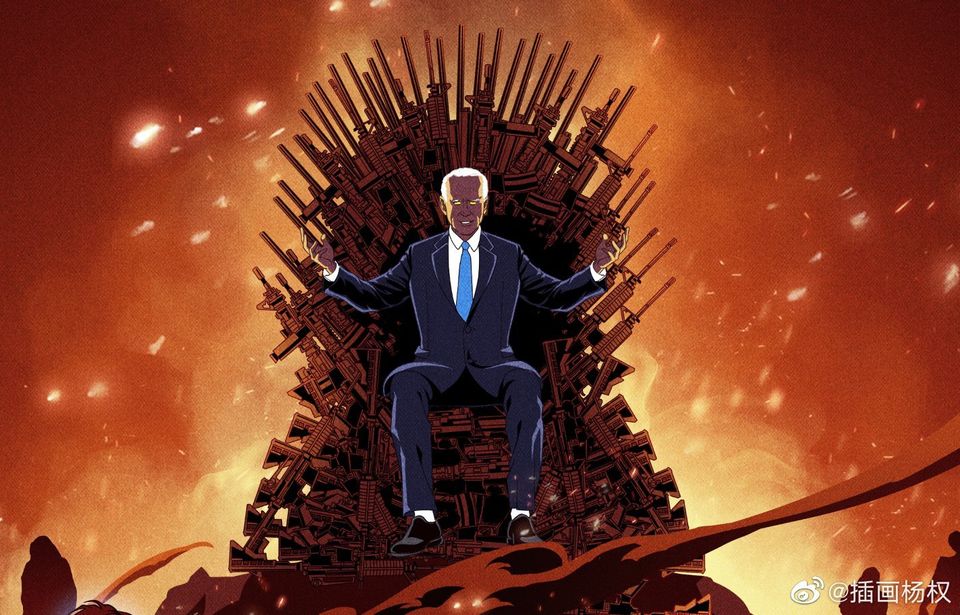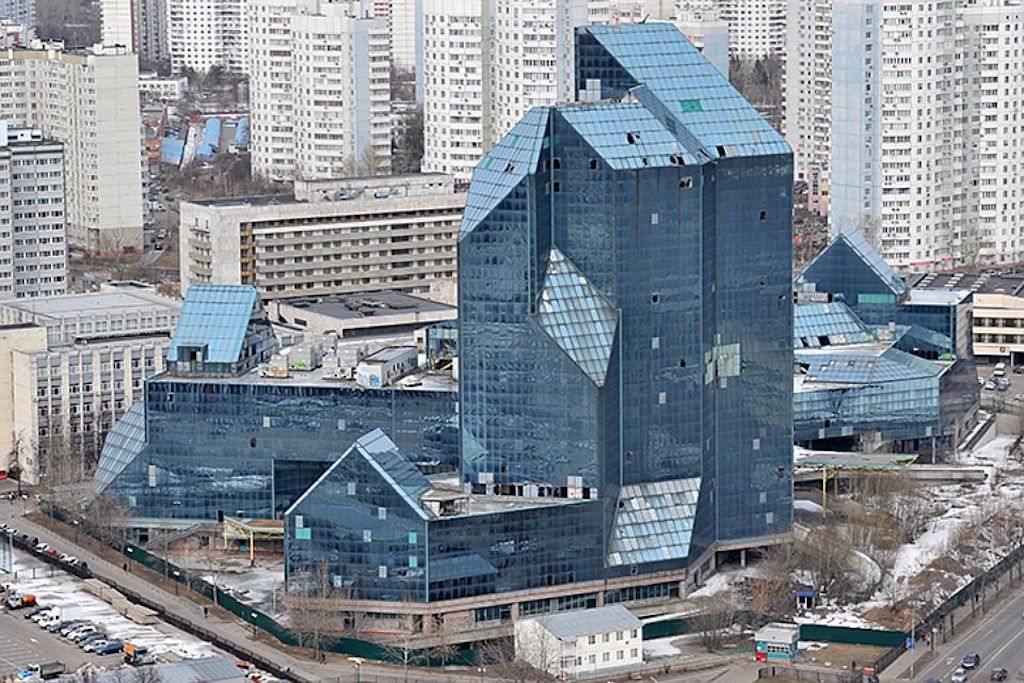Dark Brandon and American Liberal's Disillusionment with Europe

There is a running meme on the internet with relatively left-leaning, younger folks who we'd take to be left-liberals involving taking Chinese propaganda pictures of Joe Biden and the United States in general and asking why it makes him look so cool. I mean, it kind of does. He's sitting on an Iron Throne made of machine guns with dark aviators on. But there is something genuinely new about this. It's American liberals embracing being mean and embracing the state with all its power and all its baggage. Dark Brandon is an avatar for a very uniquely American muscular progressivism that harkens back to the New Deal as it really was – a lot of corporatism, national development, and militant left-liberal internationalism. This is an essay about Europe not understanding what happened in America, but it is also about my own political development.
I am thinking about this because I was at a conference yesterday put together by JFI and the Atlantic Council, which brought together a lot of Europeans to talk about the EU's green industrial strategy. To say that I left without feeling that Europe was serious is an understatement. It was a lot of paeans to the regulatory powers of the EU motivating business confidence and complaining about the America's lack of a carbon tax. The actual engineers and energy specialists in the room were half-heartedly pushing back at German economists who were talking about the perils of inflation and explaining the technical issues of energy systems with very few market solutions. At an equivilent American conference, you'd have a lot of discussion about permitting reform and social justice, but you would be able to smell the technological optimism in the room. Businesses wouldn't be complaining but selling their wares to a governmental apparatus that is very interested in buying and expanding capacity. The fiscal state is to be embraced, not shunned, ext.
What got me in this meeting was just how little Europeans understood the United States and what had happened to American liberals, in particular, since 2008. Quite bluntly, between the IRA bashing that is really an avatar for internal squabbles, never once did it come up that the EU has a serious image problem in the United States. And that image problem is not with the traditional Republican opponents of the EU but with a newly energized left-liberal arm of the Democratic Party that sees the EU as a neoliberal obstacle to radical action and a dinosaur that still believes history is over.
It wasn't always like this. Twenty years ago, the Second Iraq War threw many of us into an existential crisis about the United States. I was in my sophomore year and generally, like any young first-gen immigrant then, relatively patriotic and seriously considering joining the military. Iraq broke that since it was obvious, even to me, that the entire war was built on very false pretenses, would end in disaster, and distract from actually killing the guys we needed to kill.
At that time, Europe seemed like a beacon. It was a rationally run continent with public services that did not seem to want to go into a lunatic war. On the right, it became popular to bash Europe as a bunch of socialists, and on the liberal/left side, we were so undeveloped that we accepted that. This of course, was naive. Europe was never a socialist utopia. If anything, its welfare state was the result of a defeat of worker demands for control over production and planning. The continent and the EU were, as we now well know, THE neoliberal project.
This naivete aside, American liberals really believed in Europe. In some way, we were more Fukuyamian than Fukuyama. I think for many American liberals, there was some hope that the EU, with its civilized politics, would take over a bit of America's role as the center of the world economy and really usher in the age of the bureaucrat at the end of history. In hindsight, this is how we can understand the phenomenon of Barak Obama. Obama ran as the post-partisan figure of common sense. In that regard, he was very much a European figure, and his popularity there showed it. Obama's agenda was indeed European. More or less ordoliberal healthcare and economic policies, and an offensive but limited foreign policy. His chief idea on climate was a carbon tax, and his chief approach to trade was openness.
And then came the global financial crisis when American liberals discovered that their European heroes were actually neoliberals and that they were alone in the world. No one else was going to step up. China would do massive stimulus but pursue mercantilist policies, and Europe – and specifically Germany – would become a drag on the world economy by pursuing brain-dead austerity. You could say the crisis was America's fault. I agree but not in the dumb story of US profligacy. If there were more spending elsewhere, you'd have less need for that big American consumer, and if the US were less profligate, you'd be much poorer.
Europe, it turned out, only understood one thing, regulation, and did not have the capacity to act in a crisis except to bail out its own banks and put the burden on their south. As Adam Tooze documented in Crashed, the German and northern European resistance to coordinated fiscal expansion doomed the world to a lost decade and ended any hope of an alternative form of global economic coordination. Even worse, Europe's failure helped drag the US into continuing recession while fueling the deficit myth which helped the Tea Party come into power.
It took a while, but American liberals started getting the message. Slowly, a new cadre of left-leaning economists and policy analysts began to understand just the costs associated with America's exorbitant privilege – its relative domestic de-industrialization. Moreover, we began to see Germany for what it was, which was a danger to the world economy, free-riding on the rest of the EU and the United States. As one of that cohort, my feeling hardened after the start of Russia's intervention in Ukraine. Despite Ukraine's revolution in the name of the EU, the leading European countries moved to a track of appeasing Russia at the expense of Ukraine.
This was not a mainstream position yet. Trump and Bernie Sanders were a turning point. Before that, most American democrats did not really understand the nuances of global imbalances and fiscal policy, and, let's be honest, most do not. Even into 2020, you could find admiration for Angela Merkel for her actions in the refugee crisis and references to her as the new leader of the free world post-Trump. Elizabeth Warren expressed how she thought Merkel was the ideal leader, and Sanders spoke of Denmark as some socialist utopia. But the old Obama liberal religion that the Europeans so hoped we'd finally accept was as broken as a climate tax.
The Biden agenda is something old but also new. It is, first of all, a realization that the US can't just let the system of international monetary relations of which it sits at the center distort its domestic capital stock without political backlash. In embracing industrial policy, or as I would call it, investment policy, it is dropping the nostalgia of the 1990s, which European cosmopolitans and American liberals reached for under Obama, and instead embracing the New Deal and Hamiltonianism. Dark Brandon memes are funny, but they also speak to something. American liberals have re-embraced the state and its potential to shape the real economy directly. In conjunction, they are ready to do a global New Deal in the coming decades if domestic politics let them and they find partners.
I am not sure that Europe is ready for this moment, nor does it understand it. One very telling example is when Sholtz complained to Manchin about the made-in-America provisions in IRA, to which Manchin quickly replied with a flurry of statistics about German tariffs on US autos. A mid-Western, democratic senator will know this off the top of his head. There is a lot of resentment there about the EU's trade positions. Germany, in particular, did not do itself any more favors in the tank debates when it seemed to confirm to American elites that it still wants to mostly free-ride on American security while running mercantilist policies.
And yet, as I listen to EU politicians, I see a total ignorance of these dynamics and a lot of fear-mongering about IRA. Most of the other Americans in the room really did not understand what the big deal was. Why not complain about China, which does industrial policy on a much grander scale? Why not embrace the fact that you are a massive economy and invest in yourself too? More batteries are good for everyone? The more capacity, the better!
But as a few European colleagues pointed out on the sidelines, this isn't really about IRA. It is about the shock that Europe can't get its act together and catch up with the Zeitgeist. The EU was the ultimate neoliberal project, and it seems to have no idea how to respond to the fact that the United States is moving on without falling into old neurosis.
However, Barak Obama is not coming back. American liberalism, which Europeans have projected on as much as American liberals projected on Europe, has changed. And I am cautiously optimistic that this muscular liberal paradigm will stick. To find a way to get ahead together, we should not just be talking about specific trade legislation or industrial policy but about first principles regarding governance and the role of the state.
